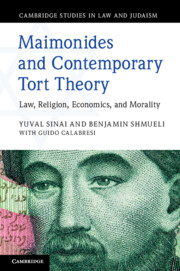Book contents
- Maimonides and Contemporary Tort Theory
- Cambridge Studies in Law and Judaism
- Maimonides and Contemporary Tort Theory
- Copyright page
- Contents
- Figures
- Introduction
- 1 Initial Presentation
- 2 Tort Liability in Maimonides’ Code:
- 3 The Foundations of the Maimonidean Theory:
- 4 The Deontological and Religious Elements of Maimonides’ Tort Theory
- 5 Consequentialist Considerations in the Guide for the Perplexed
- 6 Revisiting the Problematic Texts of the Code in Light of the Guide and Contemporary Scholarship
- 7 Maimonides’ Standard of Care:
- 8 Maimonides as a Pluralistic-Differential Scholar and Contemporary Tort Law Theories:
- 9 Reflections on Maimonides’ Tort Theory
- Index
8 - Maimonides as a Pluralistic-Differential Scholar and Contemporary Tort Law Theories:
A Dialogue and Lessons
Published online by Cambridge University Press: 10 August 2020
- Maimonides and Contemporary Tort Theory
- Cambridge Studies in Law and Judaism
- Maimonides and Contemporary Tort Theory
- Copyright page
- Contents
- Figures
- Introduction
- 1 Initial Presentation
- 2 Tort Liability in Maimonides’ Code:
- 3 The Foundations of the Maimonidean Theory:
- 4 The Deontological and Religious Elements of Maimonides’ Tort Theory
- 5 Consequentialist Considerations in the Guide for the Perplexed
- 6 Revisiting the Problematic Texts of the Code in Light of the Guide and Contemporary Scholarship
- 7 Maimonides’ Standard of Care:
- 8 Maimonides as a Pluralistic-Differential Scholar and Contemporary Tort Law Theories:
- 9 Reflections on Maimonides’ Tort Theory
- Index
Summary
Chapter 8 draws some cautious lessons from a contemporary analysis of torts for Maimonides’ theory of torts and vice versa. We offer a full conceptual description of the Maimonidean theory, based on the previous chapters, and also characterize Maimonides as a pluralistic-differential scholar. We show that, as opposed to contemporary approaches to torts, which emphasize law and economics and corrective justice, Maimonides’ approach should be characterized as pluralistic and not monistic. After showing how contemporary approaches shed light on Maimonides’ approach, we can move in the opposite direction; that is, we can draw some careful – but important – lessons from the Maimonidean theory for contemporary tort law. We suggest one possible way of learning lessons from Maimonides’ theory for contemporary law, which may help enrich the current tort law discourse. The argument that Maimonides is a true pluralist enables us to draw a careful comparison between Maimonidean and contemporary pluralistic approaches to tort law, such as those of Glanville Williams, Fleming James Jr., Izhak Englard, Gary Schwartz, Mark Geistfeld, Christopher Robinette, Steven Burton, John Goldberg, and Benjamin Zipursky. This comparison reveals differences among the approaches, as well as advantages and disadvantages of each approach.
Keywords
- Type
- Chapter
- Information
- Maimonides and Contemporary Tort TheoryLaw, Religion, Economics, and Morality, pp. 338 - 372Publisher: Cambridge University PressPrint publication year: 2020



